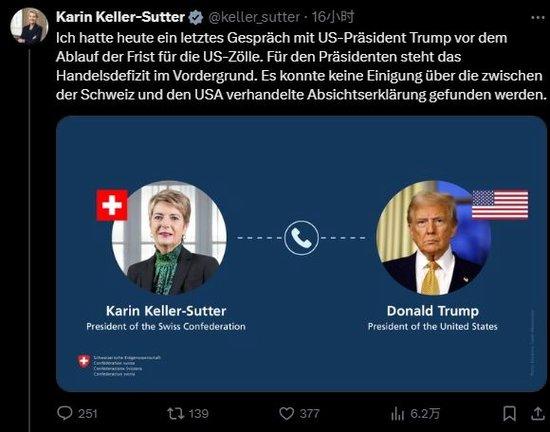

According to news reports, on July 31st, U.S. President Donald Trump signed an executive order that established tariff rates for various countries and regions, with rates ranging from 10% to 41%. Among these, the Swiss rate reached up to 39%.
August 1st is a national holiday in Switzerland. Upon learning of this “devastating” news during the celebrations, the entire country was in shock.
On the 31st, local time, the Swiss franc saw a significant drop in exchange rates. The United States is the largest export market for Swiss watches, jewelry, and chocolates. Last year, bilateral trade between the two countries reached $88.4 billion, with Switzerland’s total exports to the U.S. amounting to $60.9 billion.
The Swiss government condemned Trump’s decision. A Swiss legislator directly stated that the government was “shocked.” The President of the Swiss Federal Council, Klaus-Jürgen Keller, mentioned that the large trade surplus with the U.S. is the main reason for the high tariffs facing Switzerland.
“This is a huge blow to the export industry and the entire nation. We were all stunned,” said representatives from various sectors in Switzerland, urging the government to seek an agreement with the U.S. before the tariffs took effect on August 7th. Some analysts believe that Trump has given the country a week to negotiate, offering an opportunity to lower tariffs. However, others point out that Switzerland lacks sufficient leverage to propose conditions that could “attract” the U.S.
“The Swiss government is stunned, not yet able to recover,”
On the same day, the Swiss Federal Council released a statement saying that the country had been striving to engage in constructive negotiations with the U.S., which was deeply regrettable by the U.S. side. The statement declared that Switzerland would continue to maintain contact with the U.S., analyze new situations, and decide on subsequent steps. Based on Swiss law and international legal obligations, it seeks to reach a negotiation solution with the U.S.
Keller-Zutterer posted on social media platform X that she had spoken with Trump that day. She said, “Trump’s priority is the trade deficit.”
Negotiations between Switzerland and the United States failed to reach an agreement, as stated in a memorandum of understanding.
Earlier this week, during an interview, Keller-Jouter stated: “Switzerland is a small country. We are not a superpower. We have some economic strength, but not political power. We must accept this reality.”
Keller-Jouter, the President of the Swiss Federal Council, released a statement on X platform.
The Swiss Foreign Minister, Ignatius Kacsics, said: “We will not be discouraged and will continue our efforts to reach an agreement that benefits both sides.”
This move has also angered the usually moderate Swiss political parties. One of the main Swiss political parties, the Free Democratic Party, commented: “By making this decision, the United States has not only damaged our decades-long good relations with our country but also undermined the entire free trade system.”
A Swiss parliamentarian expressed, “It’s still unclear what the United States wants us to do,” adding that the government is currently “in shock.”
According to an insider, the Swiss negotiators were taken aback by the latest statement, having previously received “encouraging signals” from several high-ranking US officials. The individual mentioned that they plan to continue negotiations with the United States and still hope for a reduction in tariffs.
Reports indicate that just weeks ago, Switzerland submitted a trade agreement proposal to the United States. Switzerland had optimistically believed it could become one of the first countries to reach a trade agreement with Washington, but the outcome was unexpected.
Every sector in Switzerland was “stunned” at the news.
On July 31, Swiss people began their national holiday, welcoming the celebrations. However, on this day, they received “bad news” from across the ocean: starting August 7, various industries in Switzerland will face a 39% tariff on imports from the United States.
Foreign media have been closely following the news, as the 39% tariff exceeds more than double the 15% tariff on most EU products exported to the United States.
According to reports, this tax rate is higher than Trump’s initial threat of 31%, making Switzerland an exception in Europe. In contrast, the UK imposes a tariff rate of 10% on goods exported to the US, while the EU has a rate of 15%. Norway, another non-EU European country, also has a tariff rate of 15% similar to the 27 EU member states. Despite maintaining close economic and political ties with the EU, Switzerland still clings to its so-called “neutral” status, refusing to join the EU.
“The most likely reason is the surge in trade surplus with the US in 2024,” said Simon Ewen, a professor at the Lausanne IMD Business School in Switzerland. “Last year, the trade surplus between Switzerland and the US increased by 56% compared to 2023.”
This country, with a population of 9 million, mainly exports pharmaceuticals, luxury goods, machinery, and gold, leading to a significant trade imbalance with the US.
A Rolex watch in a New York City store
Data shows that in 2024, bilateral trade reached $88.4 billion, with Switzerland’s total exports to the US amounting to $60.9 billion, primarily including pharmaceutical products, medical equipment, coffee, watches, and gold. This year, the trade deficit between the two countries has worsened due to a surge in imports of medicines and gold.
It is worth mentioning that Switzerland has long been a “target” for the Trump administration. During his first term, the Trump administration labeled Switzerland as a “currency manipulator” and accused it of maintaining weak Swiss franc values to boost exports. In June this year, the U.S. Treasury Department added Switzerland to the “Unfair Economic and Monetary Actions Monitoring Country” list.
Reports indicate that nearly 40% of Switzerland’s exports to the US consist of pharmaceuticals or chemicals, many of which are exempt from tariffs. Gold is also not subject to import taxes. However, the Trump administration is conducting what it calls “national security investigations” based on Section 232 regarding imported drugs as the basis for taxation. Other industries in Switzerland, including watches, machinery, and chocolate, may be affected by a 39% tariff.
Analysts believe that the Swiss pharmaceutical industry could face a double blow, with about 60% of its export products sold to the United States. Previously, Swiss pharmaceutical giants Novartis and Roche had committed to investing billions of dollars in the US. However, this week, Novartis and Roche’s US subsidiaries were ordered by Trump to reduce drug prices.
The Interpharma Association of Switzerland stated that tariffs “threaten the Swiss economy, causing significant losses.” The association mentioned that the actions of the US affected Swiss research-based pharmaceutical companies and called for an “urgent” improvement in the Swiss pharmaceutical industry framework to “ensure investment in the development of innovative drugs remains sustainable.”
At the same time, the implementation of these tariffs comes at a time when global demand is declining, metal costs are rising, and the Swiss franc is strengthening, expected to have a heavy impact on Swiss watchmakers. It is reported that the US is the largest market for Swiss watches.
The Swiss Mechanical, Electrical and Metal Industry Association (Swissmem) said that the 39% tariff would cause “extremely serious damage” to the technology industry, exports, and even the entire country, pointing out that every penny of the Swiss economy comes from foreign trade.
“I am shocked, these tariffs are completely unreasonable and arbitrary,” said Stefan Bruppbacher, chairman of the association. “This decision endangers thousands of jobs in the industry.” Vice Chairman Jean-Philippe Col said: “This is a huge shock to the export industry and the entire country. We are really shocked.”
Is Switzerland’s GDP likely to fall by 0.9%, with a glimmer of hope?
The Swiss Mechanical Industry Association (Swissmechanic) stated that a 39% tax rate is “dangerous” for Switzerland. The organization urged the government to negotiate urgently before the tariffs take effect on August 7th, otherwise, the Swiss economy might become one of the few countries long trapped in structural competitive disadvantage.
Swiss consulting firm Porta Advisors’ Chairman and Partner Bit Wettmann stated that this news has dealt a “devastating” blow to the Swiss economy and businesses. He remarked, “The United States has initiated a unilateral trade war, which is unpredictable. This has led to an increase in the risk premium for financial assets. This will weaken the Swiss economy, the Swiss franc, and the Swiss stock market, especially crucially affecting the export sector.”
On July 31st local time, the Swiss franc exchange rate against the US dollar plummeted by about 0.4%.
Wettmann added that governments need to recognize that the era of “selection, exemptions, and special deals” has come to an end, especially for small countries.
Adrian Pretjohn, an economist at Capital Economics Europe, stated in a report that a 39% tariff rate would lead to a decrease in Switzerland’s GDP of about 0.6%, with a larger reduction if the Trump administration imposes a drug tax.
Analysts point out that Trump’s high tariffs put the Swiss government in a dilemma. In previous negotiations, American representatives forced the Swiss government to make a trade-off between maintaining global openness commitments and protecting domestic agriculture. It is reported that the agricultural industry accounts for less than 1% of Switzerland’s economy but holds significant political influence. Swiss farmers’ lobby groups have threatened to boycott any settlements that affect their interests.
At the same time, Switzerland may not be able to offer the preferential treatment other countries can provide. Previously, Switzerland had unilaterally canceled industrial tariffs. Analysts suggest that if only the Swiss government were to propose lower import tariffs for American citrus fruits, nuts, and shellfish, as well as simplifying medical device approvals, it might still not be sufficiently attractive to the United States.
JP Morgan analyst James Gzink said that if 39% of the tariffs are implemented, the prices of Swiss products in the United States could rise by more than 20%.
He stated in a report, “There is a one-week pause before implementation, indicating it might be a negotiation tactic.”
Lahur Sagar, CEO of the Swiss American Chamber of Commerce, shared the same view. He noted that tariffs were “very disappointing,” but “I don’t think this is the end.” He said, “With time left until August 7th, Trump’s executive order has set a specific window. In other words, if you are negotiating with the United States, these additional tariffs may not take effect.”
“Switzerland is a country with a population of 9 million, and the United States has about 300 million people,” Sagar humorously remarked, “So, even if every Swiss person drinks a bottle of Bourbon whiskey, eats a steak, and buys a Harley Davidson motorcycle daily, we cannot achieve a trade balance with the United States.”